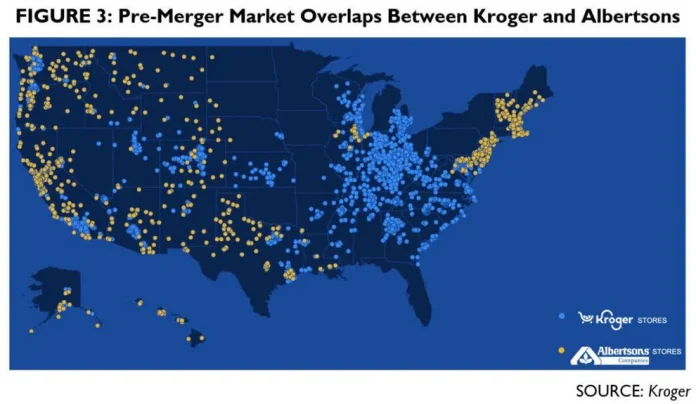(The Center Square) – A federal judge has blocked the $24.6 billion proposed merger between Albertsons and Kroger in response to a lawsuit filed against it by the Federal Trade Commission and several states.
In the ruling, Oregon-based U.S. District Judge Adrienne Nelson argued that the merger “is a plausible, relevant market for antitrust purposes,” adding that the plaintiffs “are likely to succeed on the merits and the equities weigh in favor of an injunction.”
Kroger owns Quality Food Center and Fred Meyer, while Albertsons owns Safeway and Haggen. The proposed merger was announced in October 2022. As part of the agreement, it would have sold hundreds of stores to privately-owned C&S Wholesale Grocer to avoid accusations of creating a monopoly.
The FTC sued to block the merger. The federal agency was joined in the lawsuit by Arizona, California, Illinois, Maryland, Nevada, New Mexico, Oregon, and Wyoming.
Although not a party to the federal case, Washington state filed a separate lawsuit in King County Superior Court. A decision by that court made the same day as the federal ruling concluded the merger violated Washington state anti-trust law.
Ohio’s State Attorney General has spoken in favor of it.
The FTC has argued that the merger would reduce industry competition and as a result lead to higher prices for consumers lower wages for grocery employees.
Advocates for the merger claim that it is necessary for the two grocers to compete with a changing market landscape, with much of retail sales shifting over to companies like Costco, Walmart and Amazon.
Among those in favor of the merger is the Mountain States Policy Center, based out of Idaho. President Chris Cargill told The Center Square in an interview prior to the court ruling that “this is not just about having an Albertsons store or a Kroger store. This is about competition with the giants.”
He added that the two companies make up 9% of nationwide industry sales. “It’s not as if we’re looking at 40-40-60%. This is the last best chance to try to level the playing field. But if you’re only looking at it with tunnel vision, I guess I could understand why they would be opposed to it.”
Nelson argued in her ruling that “supermarkets are distinct from other grocery retailers. Professionals understand supermarkets to be a distinct category of stores that compete with each other, and that supermarkets monitor each other’s pricing and are sensitive to changes bolsters the conclusion that supermarkets are a submarket within grocery retailers. For the reasons discussed above…the supermarkets market, consisting of traditional supermarkets and supercenters, is a relevant product market for antitrust purposes”
In a statement, a Kroger spokesperson argued that the merger would have resulted in $1 billion invested to lower grocery prices and another $1 billion in higher grocery worker wages.
The Kroger spokesperson said the company is also “disappointed” in the both the federal and state rulings, “which overlook the substantial evidence presented at trial showing that a merger between Kroger and Albertsons would advance the company’s decades-long commitment to lowering prices, respecting collective bargaining agreements, and is in the best interests of customers, associates, and the broader competitive environment in a rapidly evolving grocery landscape. The Company is currently reviewing its options.”




